
We may all be familiar with the word “recession,” when applied to economics, but perhaps not so familiar with another kind of recession: a “sex recession” – which has captured our attention in recent years as researchers try to figure out why younger people are having less sex than before.
This sex recession, after all, comes at an interesting time. Despite living in an era of hookup apps, erotic novels topping bestseller lists, and words like “open relationship” and “sex-positive thinking” becoming more popular in everyday language, many individuals are finding themselves spending very little time in the bedroom… though it may not affect the overall happiness in a relationship as much as you might think.
We surveyed 1,031 individuals in a relationship from Europe and the United States to capture a glimpse into the state of modern sex. These survey participants allowed us to hear about some of the most intimate aspects of their life: how much sex they’re having, how satisfied they feel, and how it affects their relationship. Read on to learn more about what people are (or are not) doing in bed.
Sex Isn’t The Most Important Thing
Research suggests that sex increases the bond between partners, but not everyone sees eye to eye on sex’s overall significance in romantic relationships. According to our survey, a little over half of respondents saw having sex regularly as an important part of their relationship. Only slightly more individuals – nearly 58% – said “being enthusiastic about sex” was important.
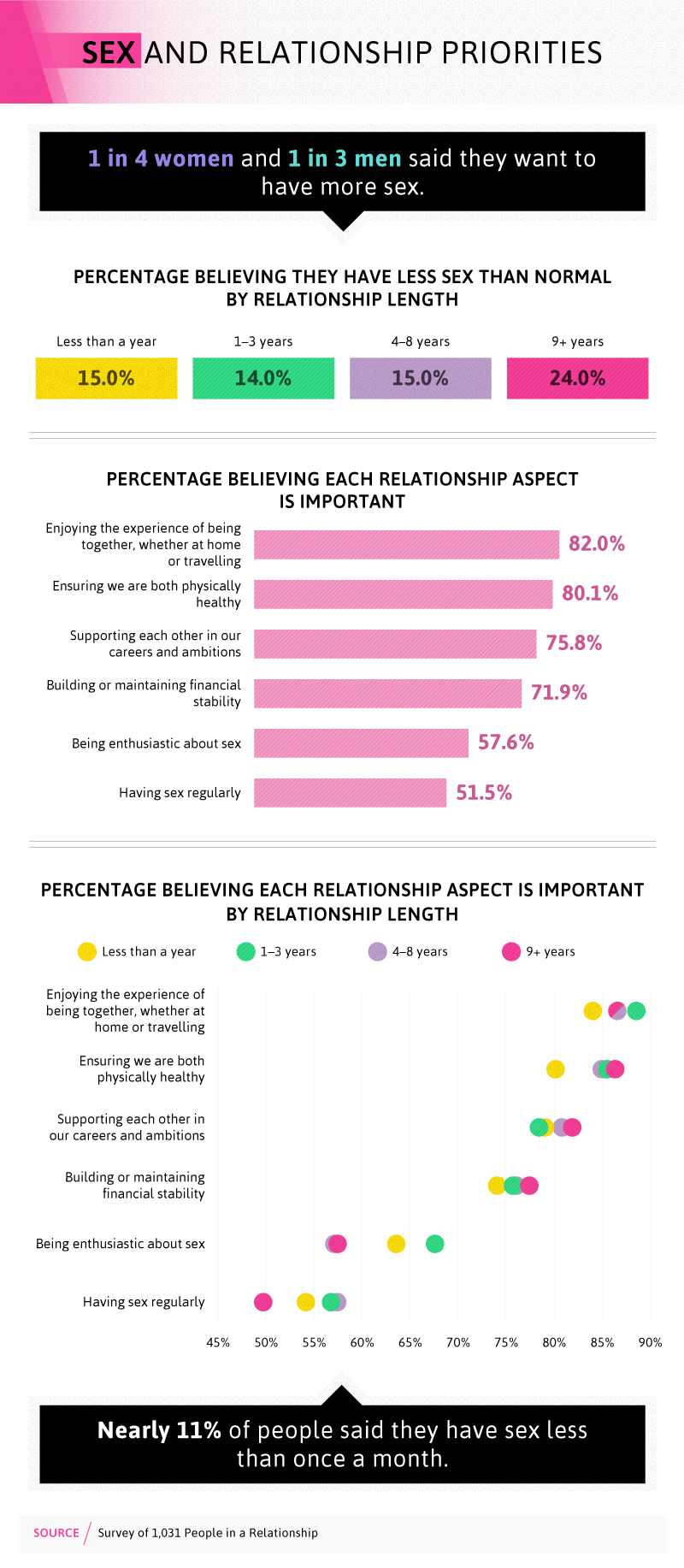
But even though this study would suggest that the majority of individuals perceive sex as a big part of their relationship, far more survey respondents placed importance on nonsexual relationship characteristics, like financial stability and having a physically healthy partner. Considering the stress that financial arguments can cause in intimate partnerships, prioritising financial harmony is a significant and proactive move towards relationship health. In terms of other relationship aspects that have nothing to do with the bedroom, about 82% of those surveyed said being with their partner (whether at home or travelling) was important, while another 75.8% said supporting each other’s careers and ambitions was crucial. There’s some variation depending on the length of one’s relationship, but one truth seems to ring true for all: While sex matters to most, it’s far from the most important factor in a relationship.
This, however, doesn’t mean having more sex wouldn’t be nice. Nearly a quarter of those in a relationship for nine or more years said they believe they have less sex than others, and even 15% of those who in a relationship for less than a year thought the same. About 11% of respondents said they had sex less than once a month.
Is the Sex Enough?
There’s no perfect number when it comes to figuring out how much sex is good, ideal, recommended, or healthy. But some couples are certainly happier with their sex life than others, and it’s normal to wonder how yours might compare.
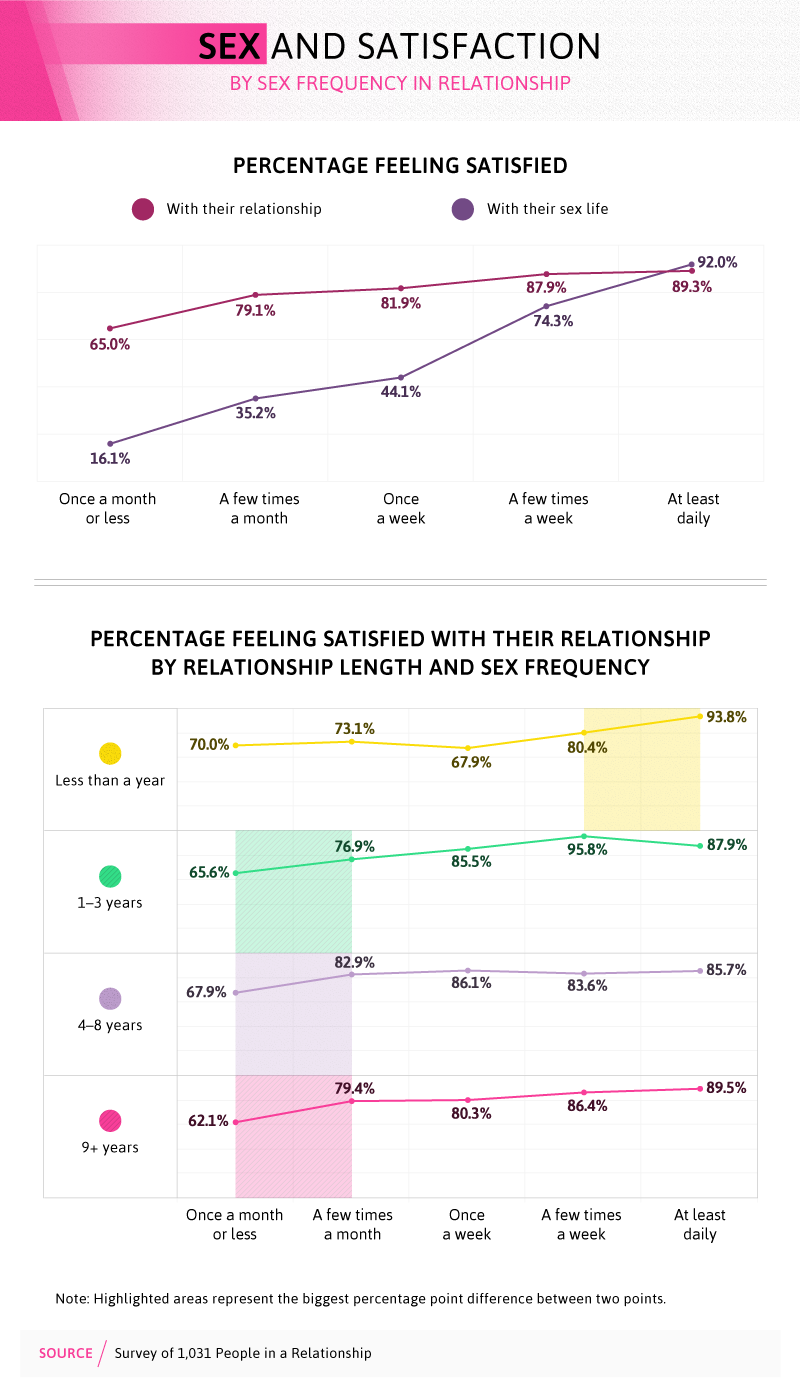
We asked survey respondents how often they had sex, and – more importantly – how happy they were with it. People were generally more likely to say they were satisfied with their relationship if they had more sex. Sixty-five percent of survey respondents who stated they had sex “once a month or less” were satisfied, compared to the 87.9% of people who had sex “a few times a week.” That being said, our line charts show that sexual satisfaction and relationship satisfaction are arguably different things.
When we viewed sex frequency and sexual satisfaction more closely, our study showed that the “more sex equals more relationship satisfaction,” wasn’t necessarily true for all relationships. Overall, having sex once a week or daily had similar rates of satisfaction, especially in relationships that were 1 to 8 years old. We found that there were some small changes in frequency that led to big changes in the relationship: increasing sex from less than once a month to a few times a month made the biggest jump in sexual satisfaction.
Gender Differences
It’s no secret that men and women have differences in sex drive or even their attitude towards sex. Add age or the length of one’s relationship to the mix, however, and these gender differences get more nuanced and complicated.
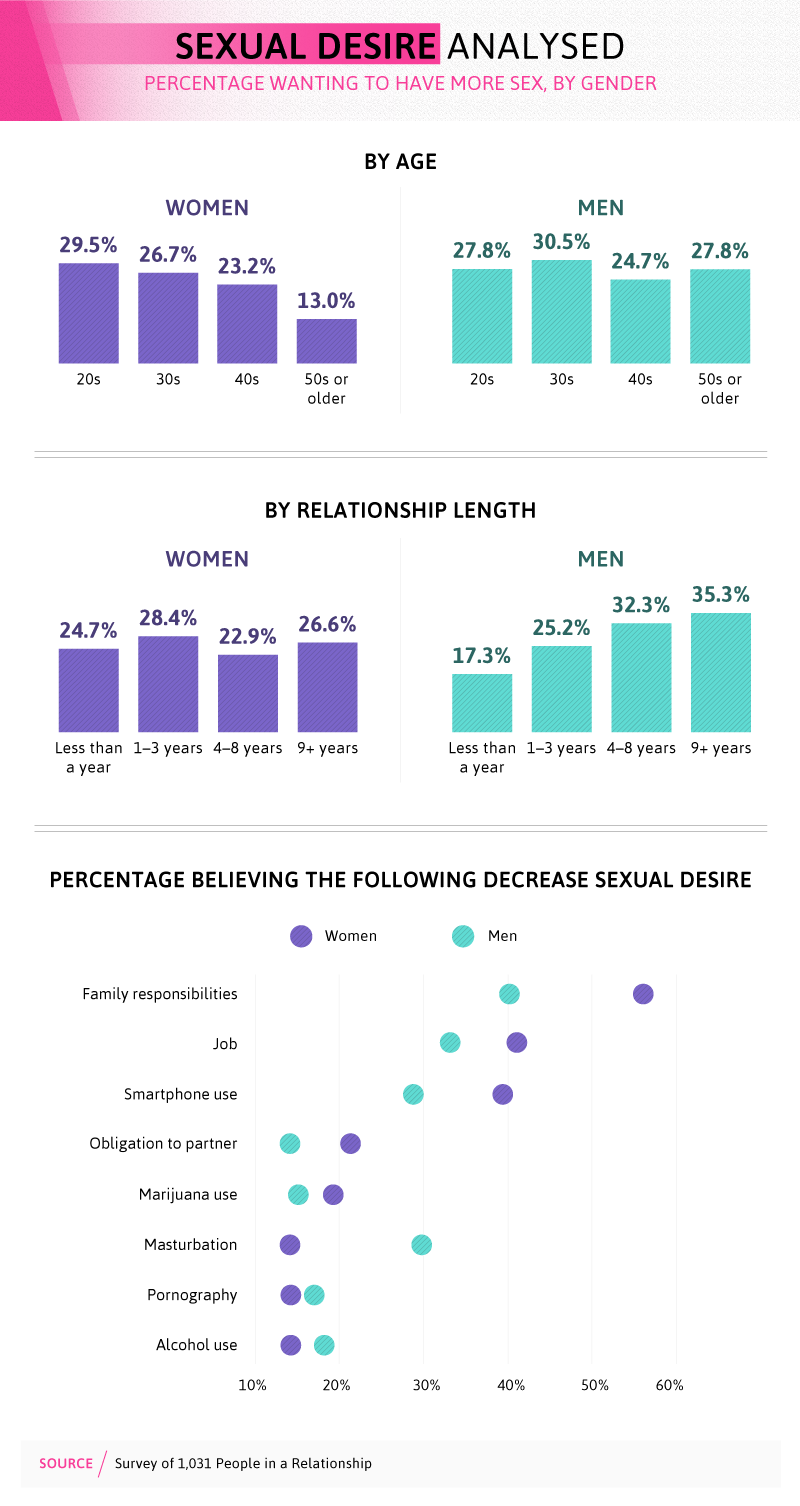
Our data suggests that around a third of men and a quarter women wanted to have more sex. However, women in their 50s or older were the least likely to want more sex – only 13% of those surveyed did – while 27.8% of men in their 50s or older did want to up the sex in their life (men in their 30s were the most likely to want more sex at 30.5%, though).
Gender differences were more pronounced when it came to relationship length. About 25% of women in a relationship for less than a year wanted more sex, compared to just 17.3% of men. However, more than 35% of men who were in a relationship for at least nine years wanted more, compared to just over a quarter of women.
But for those who aren’t getting enough, what is it that’s killing the mood? According to both men and women, family responsibilities, jobs, and smartphone use were the biggest libido killers. Nevertheless, there was a significantly greater proportion of women who said family responsibilities got in the way of their sex life: Nearly 60% of women said so, compared to around 40% of men.
Tech and Sex
More and more, journalists and researchers blame smartphones for the sex recession, going as far as accusing them of ruining sex lives. We asked survey participants about when they were most likely to use their phone, plus how they’d rate their overall sexual satisfaction.
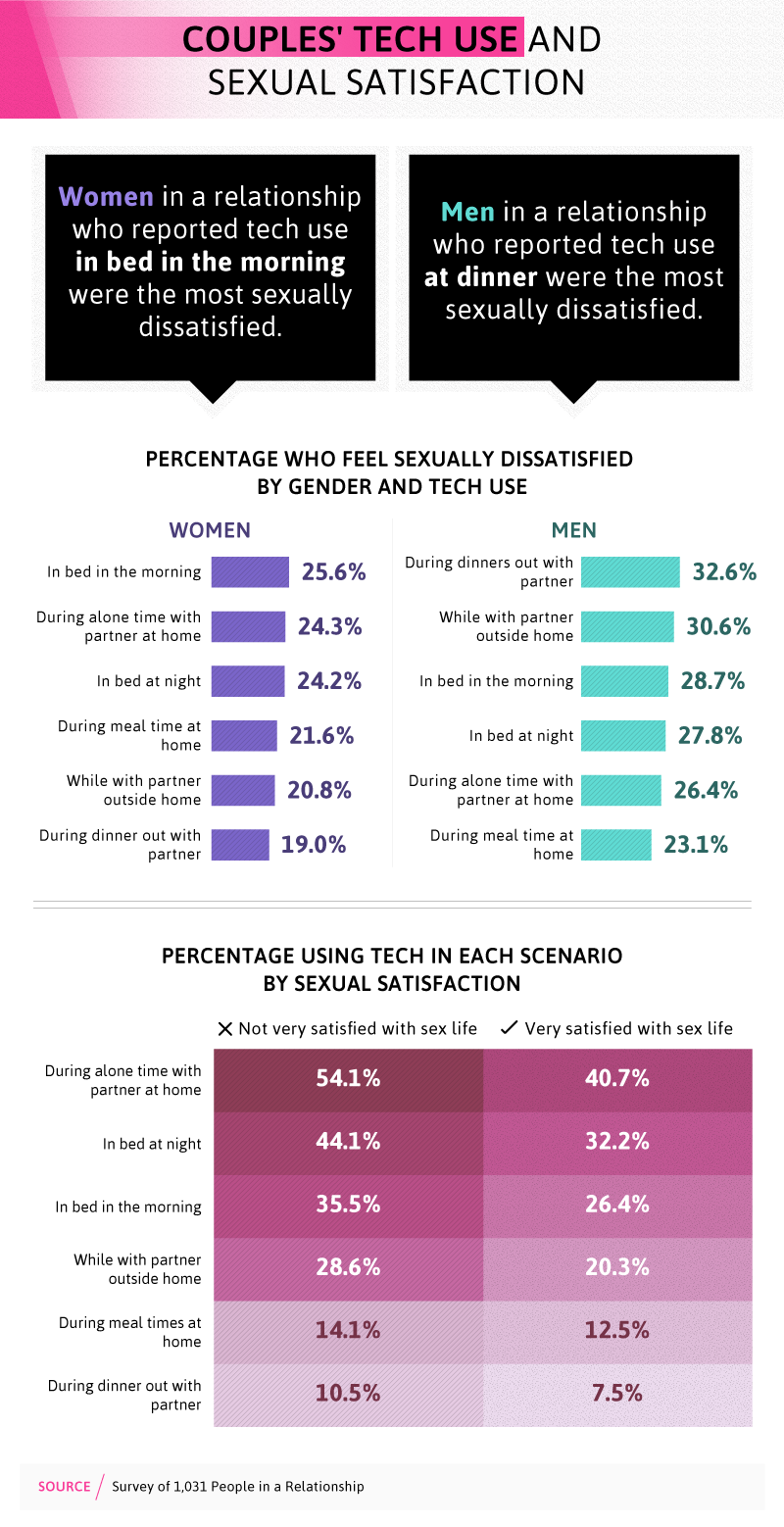
Interestingly, women who reported the use of tech devices in bed in the morning were the most sexually dissatisfied, while men who reported device use while at dinner with their partner were the least happy with their sex life. Regardless of gender, device use during “alone time with partner at home” was the most linked to sexual dissatisfaction, followed by device use in bed at night and device use in bed in the morning. The takeaway: Although it’s not a clear cause-and-effect relationship, using phones and tablets in intimate spaces is probably not doing our sex lives any good favours.
What Satisfies You?
Relationships are all unique and work in their own way, so it’s not surprising that respondents varied so much in the number of times they have sex with their partner. Sex in relationships often changes over time too, so we asked survey participants about how their current sex life differed from when they first started dating.
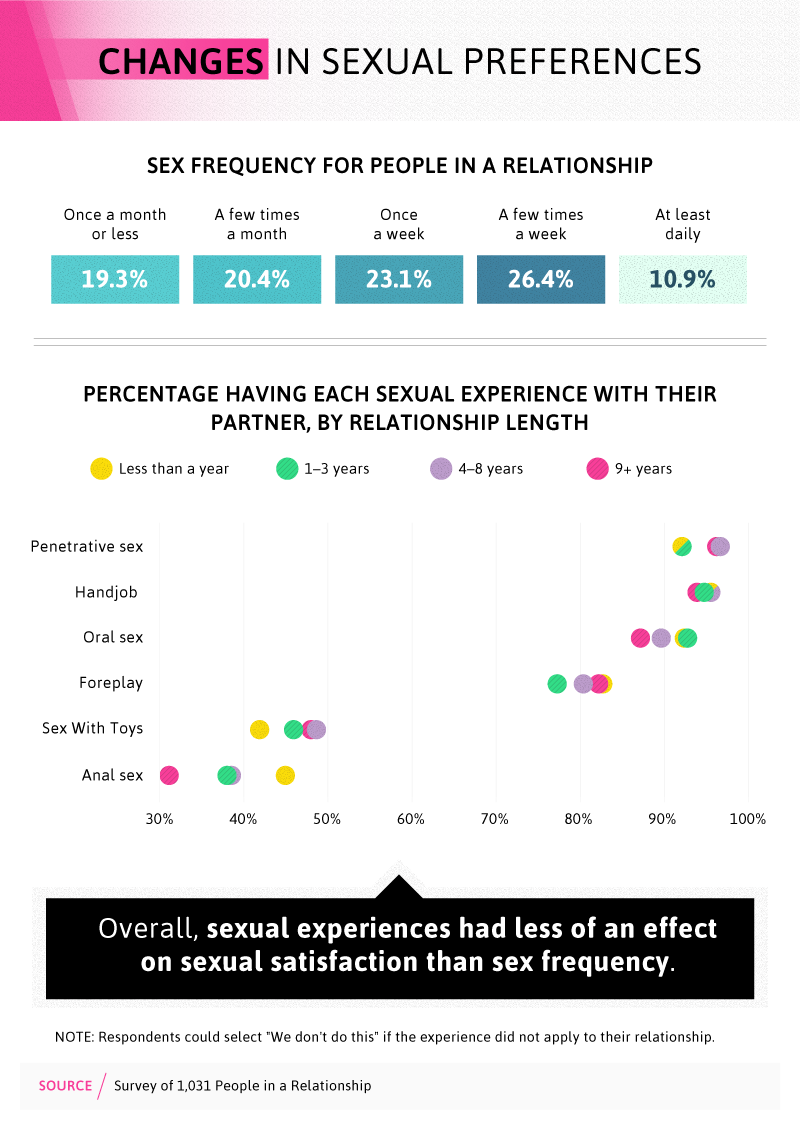
First of all, our results indicate that anal sex is one of the least popular acts, and individuals tend to do it less and less as their relationship progresses. About 45% of respondents performed anal sex when their relationship was less than a year old, compared to about 30% for those in a relationship for nine or more years. Oppositely, penetrative sex seemed to slightly increase over time as relationships progressed in length, while all relationship lengths seemed to be generally on the same page about handjobs.
Sexy Enough for Society?
How many men and women are worried about – or uncomfortable with – their current sex life? Our survey results suggest that women tended to believe they had less sex than others who are their age (19% of those surveyed thought so, compared to 15.3% of men).
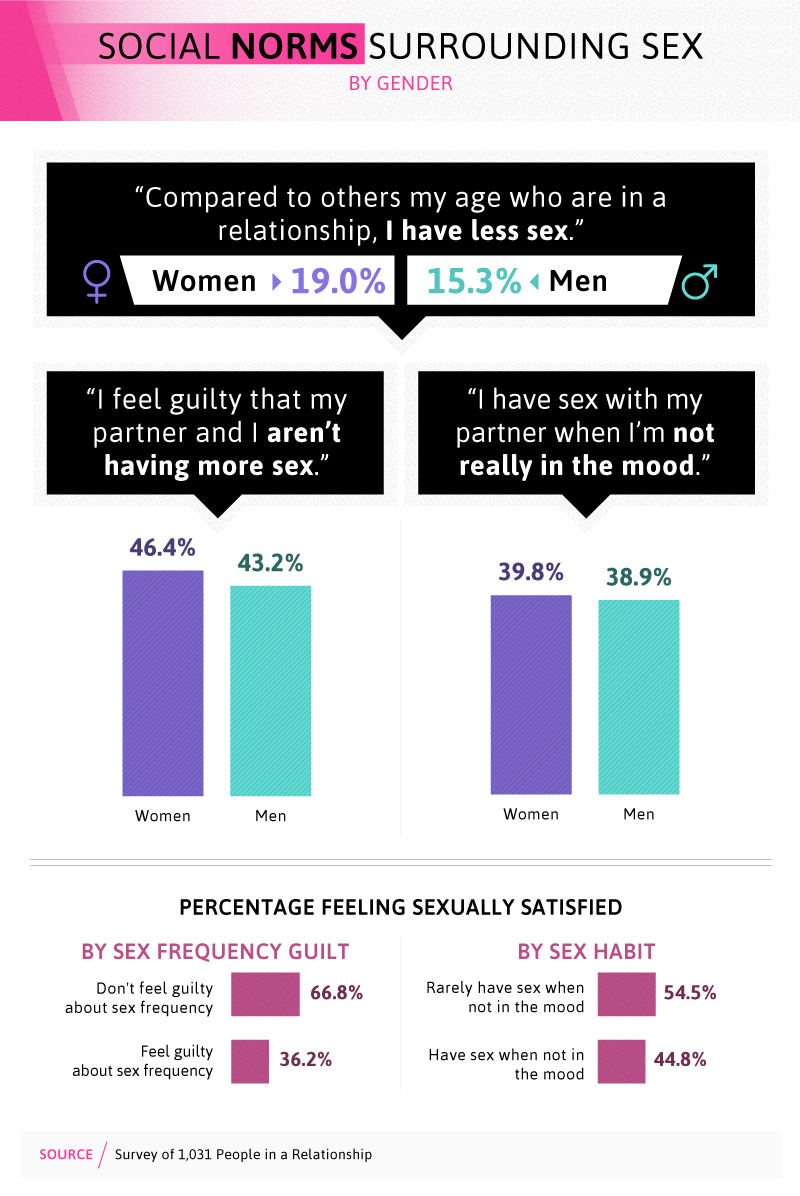
Likewise, women were more likely to agree with the statement, “I feel guilty that my partner and I aren’t having more sex” (46.4% of women and 43.2% of men agreed with this statement). Nearly 40% of both men and women said they also had sex when they weren’t in the mood.
No “Normal” When It Comes to Sex
People may be having less sex than ever, but that doesn’t necessarily mean they’re deeply unhappy with their sex life. Our survey of roughly 1,031 individuals in a relationship revealed that both men and women judge their relationships for far more than how often they make love. Meanwhile, most of those surveyed seemed generally satisfied with their sex life.
Nonetheless, the adage “the more, the merrier” might be true when it comes to sex. Individuals who had sex more often tended to be more satisfied with their relationship and sex life. Meanwhile, harbouring guilty feelings about the amount of sex they had or believing they had less sex than others tended to be linked to higher sexual dissatisfaction.
With society’s obsession with sex, it is often hard to focus on the overall health of relationships, although it is more important than ever. Visit Superdrug Online Doctor to learn more about men’s health, women’s health, and how to improve your own sexual health. With no hassle and from the comfort of your own home, take care of your personal health and see to it that you have the best sex for you.
Methodology and Limitations
We surveyed 1,031 European and American men and women in a relationship on how frequently they had sex to understand why people may be having less sex today. Around 56% of our respondents were women, and 44% were men, with ages ranging from 18 to 74. The average age of our respondents was 34 with a standard deviation of 10 years. We asked respondents about how frequently they had sex in the past six months while comparing their satisfaction with their relationship and sex life. Certain limitations apply to this data because of social desirability bias inherent to questions gauging relationship and sexual satisfaction. Other limitations, such as telescoping and exaggeration, apply. This was an exploratory look at sex and frequency of those in relationships.
Fair Use Statement
Interested in sharing our findings on the sex lives of Europeans and Americans, and what influences them? We grant you permission to share this project’s graphics and content as long as it’s for noncommercial purposes. Just don’t forget to link back to this page to give the authors proper credit. Have specific questions about our study? Reach out to us at [email protected] for more information.